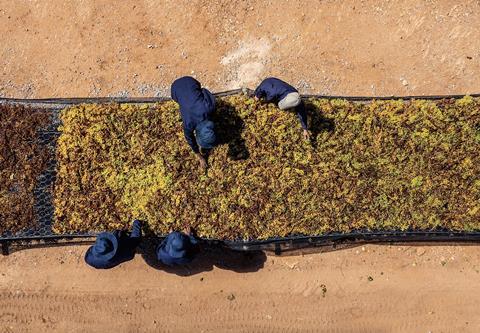As South African raisin production increases, leading local supplier PepsiCo is eyeing huge sales potential in the global healthy snacking segment
It would come as a surprise to many to learn that one of the world’s most famous soft-drink brands is playing an integral role in the development of South Africa’s burgeoning raisin industry.

For PepsiCo, buying Pioneer Foods in 2020 represented one of the iconic drinks manufacturer’s largest-ever investments outside of the US, and gave it a new foothold in South African food production across a wide range of categories.
Raisins represents a relatively small portion of Pioneer Foods’ output – the main reason for the acquisition was to give PepsiCo a platform for its ambitions in Africa – but it’s proved a serendipitous purchase given the potential the company sees for growth in the snacking sector.
“There’s a big drive in PepsiCo to grow the snacking space,” explains Nico Koch, managing executive for fruit at PepsiCo South Africa (SA) and board member at industry body Raisins SA.
“Healthy snacking is a big priority for the company so there’s a nice fit because we see huge longer-term growth opportunities in snacking, where the size of the prize is about US$100bn and is growing by around 4.2 per cent CAGR. By comparison, currently 80 per cent of dried vine fruit is sold as ingredients.”
Other suppliers struggle
South Africa is well placed to increase its presence in global raisin supply, not least due to the fact that market leader Turkey suffered a severely weather-hit winter that sent output tumbling and prices skyrocketing, while there is long-term decline in US production.
South Africa currently produces 85,000 tonnes a year, representing around six per cent of global production, but that is anticipated to hit 100,000 tonnes next year as higher-yielding cultivars continue to replace lower-yielding ones, the government invests in vineyard development and more wine producers consider switching to raisins.
The figure represents a substantial increase on the 70,000 tonnes produced as recently as 2021 and is more than double the 40,000 tonnes seen just a decade ago.
“South African raisins and sultanas have a number of compelling reasons to be considered best-in-class compared to other leading suppliers the US, Turkey and Iran,” Koch notes.
“They have the lowest residue levels of the four, the best shelf-life and most free-flowing product, and pertinently, can also be sold at a premium, giving retailers more potential to classify them in higher-margin tiers.”
Koch believes South Africa’s more consolidated industry – with just five packers compared to 17 in the US and 22 in Turkey – and a much smaller and more collaborative grower base, gives it a real advantage in producing high-quality, sustainable raisins.
“There are two main reasons why we can produce such good quality in South Africa,” he explains. “Number one is obviously environment – the weather is in our favour. It’s very hot, very dry, humidity is low, and it’s a perfect area to farm raisins. It’s hot in summer, cold in winter, and pests and diseases are not really an issue.
”On top of that you need good farmers to manage the product and we’ve got really top-quality, commercial farmers here.”
Raisin production is mainly centred in the Orange River region in the Northern Cape, with a smaller volume produced around the Olifants River in the Western Cape.
PepsiCo itself has a vine fruit facility in Upington, where they process a range of products from currants and sultanas to Flame Seedless, Crimson, Melody and Prime raisins, among others.
PepsiCo is currently the largest raisin packer in South Africa, procuring around 40 per cent of the country’s production, but has ambitions to up its share to 50 per cent in the next five years.
“That’s what we want to achieve,” says Koch, “and to move into the healthy snacking space because that’s where we can really add value. It’s obviously about brand awareness, innovation and new products, but also the trend is our friend because people want to snack healthily. But of course, the number one priority is taste, and you have to perform on that too.”
Snacking market boom
The opportunity is unquestionably there. Koch highlights figures from Fortune Business Insights that show the global healthy snacking market is predicted to be worth as much as US$108bn in 2027, up from US$78m just five years ago.
That’s driven by a consumer shift towards balanced lifestyles that feature more nutritionally added-value foods that provide guilt-free indulgence and affordability – all factors that raisins have in abundance.
“We see opportunity to develop a number of products where we are playing in the snacking space,” Koch continues. “We are focusing on three spaces: the healthy snacking space, which is more functional; better-for-you snacking, such as yoghurt-coated raisins; and conscious indulgence, where continues are sharing something such as chocolate with raisins. We are also launching new snack mixes in this space as well.”
Europe remains PepsiCo SA’s biggest export market for raisins, taking around 65 per cent of its volumes, with 15-20 per cent going to North America and smaller volumes in Japan and Australasia.
With demand for healthy snacking growing across the board, there will be hope to grow raisin consumption in all key markets, as well as domestically within South Africa.
With a highly organised industry and strong quality and sustainability credentials, South Africa has a great opportunity to be seen as the supplier of choice as other source nations struggle.



